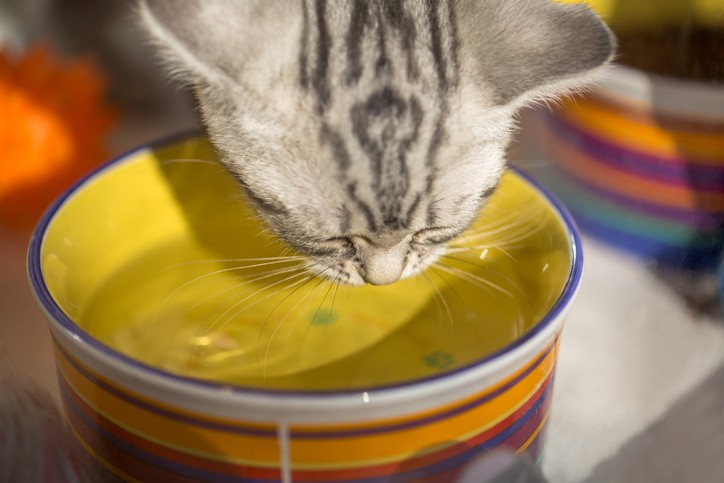
Here’s How to Tell if Your Cat is Dehydrated and How to Help
If you have a cat, it’s important to learn how to recognize signs of problems before they get out of hand. Cats can become dehydrated very quickly, and understanding signs of dehydration in your cat can make a difference in their ability to recover from the underlying cause of the problem.
In the article below, you’ll find out more information about some of the most common symptoms of dehydration in cats. From there, you’ll also find some solutions to help treat your cat’s dehydration, depending on its severity. Read on to find out more information about caring for a dehydrated cat.
Symptoms of Dehydration in Cats
There are a few different symptoms to watch for to let you know if your cat is dehydrated or not.
Loss of Skin Elasticity
You can test your cat’s skin elasticity on your own at home. Gently grab the flap of skin at their shoulder blades and pull it straight up. If it immediately snaps back into place, then their skin elasticity is good. If it takes a while to settle back where it is supposed to be, this is a sign that they have poor skin elasticity.
Tacky or Sticky Gums
Tacky gums or gums that have a sticky feeling when you touch them may indicate dehydration in cats. If your cat’s saliva is very thick and sticky, this may also be a related symptom that can let you know they are dehydrated.
Paleness of the Gums and Tongue
Your cat’s gums and tongue may look paler than normal if they are dehydrated. This symptom may be associated with other conditions too, however, so keep this in mind when trying to determine what’s going on with your pet.
Sunken Eyes
Sunken eyes may occur in cats with a variety of health problems and conditions. Dehydration, however, is one of the most significant and most common causes of sunken eyes in cats. If your cat’s eyes look sickly or abnormal to you, then this could indicate that they are suffering from severe dehydration.
Weakness and Lethargy
Cats with any health problem at all are likely to become weak and lethargic. However, if your cat’s weakness and lethargy are accompanied by any other items on this list, then you may be able to safely assume they are dehydrated. Look for other symptoms that may help you narrow down what is causing your cat’s weakness and lethargy as well.
Treatments for Dehydration in Cats
Be sure to talk with your veterinarian about your cat’s symptoms and to decide which treatment option is best for your pet.
Provide Clean Water
Make sure your cat always has access to plenty of fresh, clean, cool water. This way, they will be more likely to drink enough water when they need to, rather than trying to wait for you to refill the dish after a long time.
Feed Wet Food
Some cats simply don’t drink enough water, no matter how much clean water you provide them. For these cats, it can be beneficial to give wet food, which naturally contains moisture that can help your cat stay hydrated. Try balancing your cat’s dry and wet food diet for the best results.
Moisten Food with Broth
If your cat is still uninterested in staying hydrated, you may be able to convince them by putting some broth on dry or wet food. Stick to unflavored, unseasoned broths only, and do not provide broth that contains excess salt, as this will only contribute to the dehydration problem.
Try Cat “Soup” Supplements
It is possible to purchase cat “soup” supplemental food items from most pet food stores. If you try your cat on one of these soups or broths, you may find that they are more willing to stay hydrated than they would be with other options.
IV Fluids from the Vet
In moderate to severe cases of dehydration, your cat may need a round or more of IV fluids from the vet. And if your cat is extremely dehydrated, they will likely need to stay with the emergency vet for a few rounds of IV fluids to help them recover fully from the issue.
Treat the Underlying Problem
It is also necessary to figure out what has caused your cat to become dehydrated in the first place. From there, you should work with a your Boston Veterinary Clinic vet to figure out the best course of treatment or management to prevent this from happening again in the future.
Preventing Dehydration in Cats is Important
Dehydration can be very dangerous if left untreated, and it can even become fatal very quickly in cats. If you know or suspect your cat is dehydrated, try taking care of the problem at home, but be ready to go to the emergency vet if possible.
If your cat remains dehydrated for more than a day, or if they are uninterested in or unable to drink water, then they need to see an emergency vet. Your cat may need IV fluids and will also need help treating the underlying cause of the dehydration as well.
Boston Veterinary Clinic is here for all your cat’s wellness and care needs. Book an appointment online today!